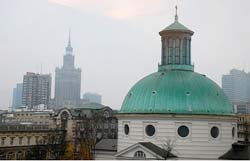Living in the Intersections:
Asking the Big Questions of Science and Religion
By Philip Clayton
 The dialogue between science and religion has fallen on rough times. Over the last quarter century, a rich interdisciplinary field had grown up. International collaborations were flourishing, cutting-edge publications drew widespread attention, Templeton money flowed, conferences and courses drew thousands of participants.
The dialogue between science and religion has fallen on rough times. Over the last quarter century, a rich interdisciplinary field had grown up. International collaborations were flourishing, cutting-edge publications drew widespread attention, Templeton money flowed, conferences and courses drew thousands of participants.
But sometime around 2000 the trend reversed. Recriminations began to flow. As in most cases when a relationship goes sour, there is truth on both sides. Religious opponents of science claimed that science is inherently atheistic and anti-Christian. The New Atheists shot back: if you reject science in the name of your religion, we have no choice but to resist your religion in the name of science. Richard Dawkins and Christopher Hitchens began to claim that 9/11 showed the true face of religion. Conservatives sought to silence them with Intelligent Design.
A Tragic Divorce
As the rhetoric became more harsh and hate-filled, you and I became the victims -- those of us with interests in both science and religion, those who want to explore the rich connections without reducing or eliminating either one. Many of us are curious to know what challenges or tensions, and what kinds of harmony, arise at their intersections today. We who believe in God even have a religious motivation for dialogue: the creation of the universe by God suggests deep connections between the languages of nature and of the divine.
In fact, the tragedy is more urgent. With (human-caused) global climate change, and the mass extinctions that it will soon bring, the biosphere now faces its biggest crisis since the last Ice Age. Religions can stress the call to stewardship that lies at the core of their traditions. But how will we know what the problems are, and how to overcome them, without scientific partnerships? So science can provide the data. But data alone won't motivate humans to sacrificial changes of attitude and lifestyle.
Just when the planet most needs close collaboration between science and religion, the increasingly harsh rhetoric between them is making partnership impossible. How can we move beyond this stalemate? How can the two sides overcome their suspicion and hostility -- for the sake of the planet, if for no other reason?
Return of the Big Questions
So what do you discover when you lower your fists and sit down over coffee or a beer with discussion partners from The Other Side? You discover a fascinating array of topics, new fields to learn, ideas to explore, new insights to gain. I often joke that I found greater philosophical challenge, and richer philosophical results, during the "Science and the Spiritual Quest" discussions that I led (check out SSQ publications such as Practicing Science, Living Faith) than I did as a philosophy professor in a university department. Here are just a few of the topics currently being explored:
- Is this universe really "fine-tuned" for the emergence of life? Are we meant to be here? Or is this just one out of infinitely many universes in the multiverse? Are we at home in the universe in a way that makes our existence religiously meaningful?
- Science now recognizes a continual process of emergence across cosmic history, not just a reduction of more complex entities down to a few core laws and fundamental particles. Can our religious traditions help to interpret the possible telos or goals of this emergence?
- Scientists identify trends and patterns in biological evolution, but biology does not allow one to speak of progress. Do our religious traditions allow us to speak of evolutionary progress and, if so, what do we mean by that term? What evidence can we point to when we as religious persons speak of progress?
- Biology shows that humans are part of a continuous evolutionary trajectory that runs from the first single-celled organisms through all the plants and animals to our closest cousins, the great apes. Do we, as members of religious traditions, need to revise some of our traditional teaching about what humans are ("theological anthropology") in light of this scientific discovery? Should it affect the ethics of how we treat other animals and ecosystems?
- Evolutionary psychology today provides biological explanations for many features of human thought and emotion. Cognitive science of religion shows how religious beliefs have helped humans to survive in often hostile environments. If biology can explain the "selective advantages" of religion, does that mean that religious explanations of belief -- for example, "I believe in God because God exists" -- are false? Do scientific explanations of religious beliefs undercut those beliefs?
- Over the coming years and decades, we will learn how more and more of our most intimate mental experiences -- our thoughts, wishes, and dreams -- are correlated with specific brain regions, neurotransmitters, and neural firings. Does this mean that we are "nothing but a pack of neurons" (Francis Crick)? If not, what is the "something more" of consciousness? Can our religious traditions help say what this "something more" is?




